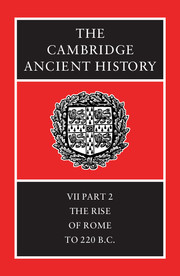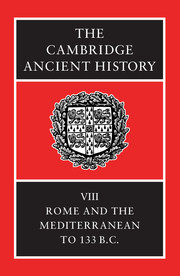50 results

The Cambridge Ancient History
-
- Published online:
- 28 March 2008
- Print publication:
- 29 March 1990
BIBLIOGRAPHY
-
- Book:
- The Cambridge Ancient History
- Published online:
- 28 March 2008
- Print publication:
- 29 March 1990, pp 673-771
-
- Chapter
- Export citation
Fig. 50:The city of Rome in the early third century b.c.
-
- Book:
- The Cambridge Ancient History
- Published online:
- 28 March 2008
- Print publication:
- 29 March 1990, pp -
-
- Chapter
- Export citation
Frontmatter
-
- Book:
- The Cambridge Ancient History
- Published online:
- 28 March 2008
- Print publication:
- 29 March 1990, pp i-xviii
-
- Chapter
- Export citation
Index
-
- Book:
- The Cambridge Ancient History
- Published online:
- 28 March 2008
- Print publication:
- 29 March 1990, pp 772-811
-
- Chapter
- Export citation
Chronological Table
-
- Book:
- The Cambridge Ancient History
- Published online:
- 28 March 2008
- Print publication:
- 29 March 1990, pp 645-672
-
- Chapter
- Export citation
Map 11: The western Mediterranean in the third century
-
- Book:
- The Cambridge Ancient History
- Published online:
- 28 March 2008
- Print publication:
- 29 March 1990, pp -
-
- Chapter
- Export citation
Index
-
- Book:
- The Cambridge Ancient History
- Published online:
- 28 March 2008
- Print publication:
- 07 December 1989, pp 593-625
-
- Chapter
- Export citation
Three Hellenistic Dynasties
-
- Book:
- The Cambridge Ancient History
- Published online:
- 28 March 2008
- Print publication:
- 07 December 1989, pp 517-518
-
- Chapter
- Export citation
Contents
-
- Book:
- The Cambridge Ancient History
- Published online:
- 28 March 2008
- Print publication:
- 07 December 1989, pp v-x
-
- Chapter
- Export citation
Map 11: Greece and Asia Minor
-
- Book:
- The Cambridge Ancient History
- Published online:
- 28 March 2008
- Print publication:
- 07 December 1989, pp -
-
- Chapter
- Export citation
Chronological Table
-
- Book:
- The Cambridge Ancient History
- Published online:
- 28 March 2008
- Print publication:
- 07 December 1989, pp 523-542
-
- Chapter
- Export citation

The Cambridge Ancient History
-
- Published online:
- 28 March 2008
- Print publication:
- 07 December 1989
Map 13: Asia Minor and Syria
-
- Book:
- The Cambridge Ancient History
- Published online:
- 28 March 2008
- Print publication:
- 07 December 1989, pp -
-
- Chapter
- Export citation
Genealogical Tables
-
- Book:
- The Cambridge Ancient History
- Published online:
- 28 March 2008
- Print publication:
- 07 December 1989, pp 518-522
-
- Chapter
- Export citation
6 - Roman government and politics, 200-134 B.C.
-
-
- Book:
- The Cambridge Ancient History
- Published online:
- 28 March 2008
- Print publication:
- 07 December 1989, pp 163-196
-
- Chapter
- Export citation
Preface
-
- Book:
- The Cambridge Ancient History
- Published online:
- 28 March 2008
- Print publication:
- 07 December 1989, pp xi-xiv
-
- Chapter
- Export citation
List of text-figures
-
- Book:
- The Cambridge Ancient History
- Published online:
- 28 March 2008
- Print publication:
- 07 December 1989, pp x-x
-
- Chapter
- Export citation
List of maps
-
- Book:
- The Cambridge Ancient History
- Published online:
- 28 March 2008
- Print publication:
- 07 December 1989, pp x-x
-
- Chapter
- Export citation
BIBLIOGRAPHY
-
- Book:
- The Cambridge Ancient History
- Published online:
- 28 March 2008
- Print publication:
- 07 December 1989, pp 543-592
-
- Chapter
- Export citation

